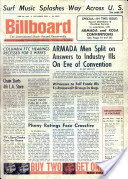 From the MCRFB NEWS archive: 1963
From the MCRFB NEWS archive: 1963
The Bill Gavin Newsletter (June 29, 1963)
From the Desk of Bill Gavin Billboard Contributing Editor
O U R R E C E N T C O L U M N O F D I R T Y L Y R I C S brought several interesting letters from radio people.
Ralph Howard, program director of WOTT, Watertown, New York, comments that “a bad record doesn’t make a bad kid.” He calls attention to some of our old standards whose lyrics can be interpreted in a suggestive vein. “I try to play what sells,” he continues, “and if it does, I’m a winner.”
 Steve Joos, program director of WCOL, Columbus, Ohio, writes that his simple solution for the problem of records with unacceptable lyrics is not to play them. He forcefully rejects the thinking that the station has to play a record just because the competition is doing so. He comments that the stations whose ratings are shaky enough to be harmed by the omission of one or two records is in a very bad way.
Steve Joos, program director of WCOL, Columbus, Ohio, writes that his simple solution for the problem of records with unacceptable lyrics is not to play them. He forcefully rejects the thinking that the station has to play a record just because the competition is doing so. He comments that the stations whose ratings are shaky enough to be harmed by the omission of one or two records is in a very bad way.
Jack Sharp, operations manager of KFJZ, Ft. Worth, suggests a “gentleman’s agreement,” among the broadcasters of a community that they will jointly refuse to play an objectionable record. He remarks that this would not be in any sense discriminatory or illegal but would “be merely self-policing that the NAB has been striving for.” “It is no more discriminatory,” he continues, than my top 40 station refusing to play a fiddle-screeching hoedown, nasal, crying-in-my-beer song that has actually sold 4,000 records in my market.”
L E T ‘ S C O N T I N U E W I T H M O R E O F Sharp’s thoughtful letter: “Even if a program director and his competition cannot come to an agreement on a ban, he still does not have a reason to fall back on that tired old excuse that ‘if I don’t play the record, my competitor will, and the kids will go there to hear the record.’
“This, says Sharp, “is the biggest bunch of garbage in radio. The program director who programs strictly because he might lose some listeners is cutting his own throat. I defy that program director to show me a market in the United States where the omission of one record from his playlist will cause the ratings to slip.”

“One of your correspondents asked the question of where the action should come from, the record industry, or the radio industry. The record industry is far too big ever to police offending labels. So the suggestive records will always show up, and somebody will always play them. The only solution lies in the individual market, and I refuse to believe there are program people out there, anywhere, who will fail to at least discuss the merits of various records with their competitors. They may fail to agree, but they will not fail to listen, discuss and to at least talk.
“After a few bans in major markets, agreed upon in advance by program men, perhaps the offending labels will take a second look at the advisability of attempting to peddle trash. Such is perhaps a long shot, true, but there certainly isn’t any other way to clean up the airways.”
O U R T H A N K S G O E S O U T T O Jack Sharp, Steve Joos, Ralph Howard, and many others in the field who wrote in sharing their views. Obviously, certain other broadcasters are well aware of this problem and are doing something about it. Perhaps their general attitude is best expressed by Bob Osborne, WIL, St. Louis. With reference to an objectionable disk that his station was not playing, of his reply, he says: “Who needs it?” END
___
(Information and news source: Billboard; June 29, 1963)
![]()
